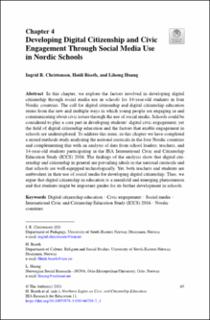Developing Digital Citizenship and Civic Engagement Through Social Media Use in Nordic Schools
Chapter
Published version
Permanent lenke
https://hdl.handle.net/11250/3013595Utgivelsesdato
2021Metadata
Vis full innførselSamlinger
Originalversjon
Christensen, I. R., Biseth, H. & Huang, L. (2021). Developing Digital Citizenship and Civic Engagement Through Social Media Use in Nordic Schools. I H. Biseth, B. Hoskins & L. Huang (Red.), Northern Lights on Civic and Citizenship Education: A Cross-national Comparison of Nordic Data from ICCS (s. 65-92). Springer International Publishing. https://doi.org/10.1007/978-3-030-66788-7_4Sammendrag
In this chapter, we explore the factors involved in developing digital citizenship through social media use in schools for 14-year-old students in four Nordic countries. The call for digital citizenship and digital citizenship education stems from the new and multiple ways in which young people are engaging in and communicating about civic issues through the use of social media. Schools could be considered to play a core part in developing students’ digital civic engagement, yet the field of digital citizenship education and the factors that enable engagement in schools are underexplored. To address this issue, in this chapter we have completed a mixed methods study analyzing the national curricula in the four Nordic countries and complementing this with an analysis of data from school leaders, teachers, and 14-year-old students participating in the IEA International Civic and Citizenship Education Study (ICCS) 2016. The findings of the analysis show that digital citizenship and citizenship in general are prevailing ideals in the national curricula and that schools are well-equipped technologically. Yet, both teachers and students are ambivalent in their use of social media for developing digital citizenship. Thus, we argue that digital citizenship in education is a manifold and emerging phenomenon and that students might be important guides for its further development in schools.

